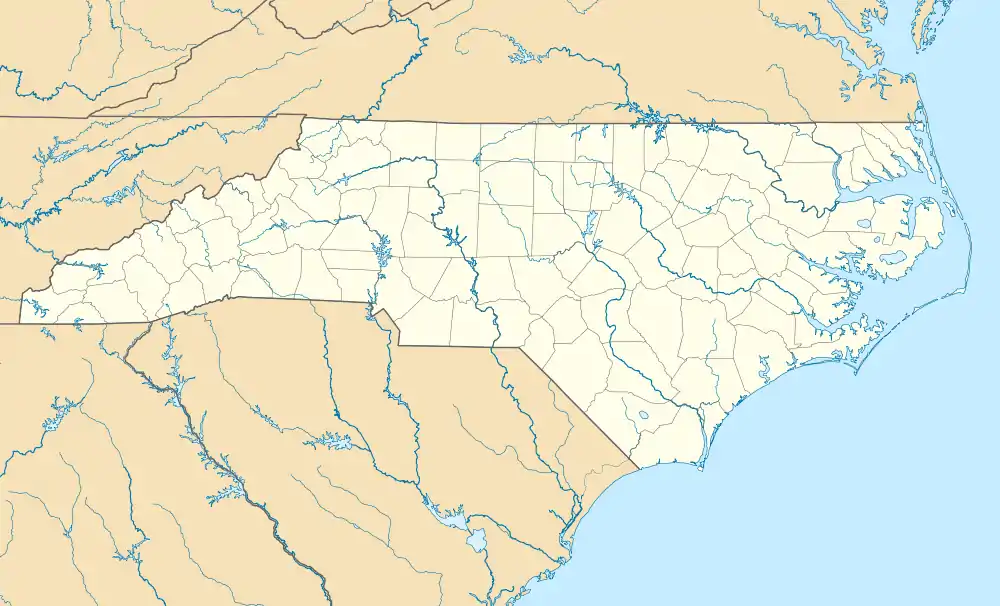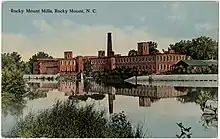Rocky Mount Mills | |
 | |
 As seen from Battle Park on the Tar River | |
  | |
| Location | 1151 Falls Rd, Rocky Mount, North Carolina |
|---|---|
| Coordinates | 35°57′33″N 77°48′10″W / 35.95917°N 77.80278°W |
| Built | 1816 |
| Architectural style | Greek Revival |
| Website | www |
| NRHP reference No. | 80002891[1] |
| Added to NRHP | February 1, 1980 |
Rocky Mount Mills, located in Rocky Mount, North Carolina, was the second cotton mill constructed in the state of North Carolina, dating back to 1816. Capitol Broadcasting Company bought the 150-acre (61 ha) mills in the 2007 and has since redeveloped it into a mixed-use campus of breweries, restaurants, lofts, office, and event space.[2]
History

"The first use of slaves in a North Carolina cotton mill occurred in 1817 when another planter, Colonel Joel Battle, joined with Henry A. Donaldson, a former Rhode Island manufacturer, to establish the Rocky Mount Cotton Mills on the falls of the Tar River. It contained over two thousand spindles and had a working force composed entirely of Negroes- the majority were slaves but there were also a few free Negroes. For thirty-four years Negroes were employed continuously by this company. In 1825 Henry A. Donaldson with George McNeil as his partner constructed a new mill in Fayetteville, NC approximately the size of the one in Rocky Mount. Only slaves were used as its working force."[3]
"...Especially before the Civil War, according to historian Holland Thompson, "a majority of the people in the Middle and Western counties [of North Carolina] dressed chiefly in the clothes of domestic or local manufacture." A superintendent of the Rocky Mount Mills recalled that in the 1850s he sold most of the coarse yarns produced at the mill "in five pound bundles for the country trade- this was woven by the country women on hand looms." He sold the surplus yarns for "coarse filling for the Philadelphia market." During the antebellum period and well into the twentieth century, North Carolina was known for its "little spinning mills" that produced lower grades of yarn for home manufacture and later for the weaving mills of New England and the Middle Atlantic States."[4]
During the last months of the conflict, the Confederacy drew its entire supply of textile goods from North Carolina mills. Northern troops recognized the significance of the textile industry's contribution to the war effort. In raids led by General William T. Sherman, Union troops laid waste to most of Eastern North Carolina's manufacturing base by burning the Rocky Mount Mill on the Tar River, the Great Falls Mill in Rockingham, NC, and five of the six mills in the Fayetteville vicinity. In the western counties, Union General George Stoneman stationed his cavalry in the Fries Woolen and Cotton Mill while his troops destroyed nearly 1,700 bales of cotton the company had stored in High Point, NC. Stoneman's raiders also set fire to Patterson's Mill in Caldwell County, a woolen mill in Guilford County, and a cotton mill in Salisbury, NC that had served as a Confederate prison during the war. Those mills that escaped direct physical destruction during the final months of the war nevertheless entered the postwar period in a weakened condition with little operating capital, obsolete or worn-out machinery, and a sharply reduced demand from local markets.[5]
From 1825 to 1883, the Battle family maintained ownership of the mill. As the southern cotton industry expanded after the Civil War, the cotton mill experienced rapid growth. The company also supported a residential village for employees, which was eventually incorporated into the city of Rocky Mount in the 1920s. The mill was a major supplier of cotton yarn to the United States Army during World War II. The mills and surrounding mill village are included in the Rocky Mount Mills Village Historic District.
The United States suffered a general decline in the textile industry, and by the time the mill closed in 1996, it was the oldest Southern textile company.[6]
Redevelopment
Rocky Mount Mills has been in the process of redevelopment since 2014 by Capitol Broadcasting Company, which also owns the popular American Tobacco campus in downtown Durham, North Carolina. Its main attraction is as an incubator for craft breweries, as well as being home to a number of restaurants. The mill itself has been turned into lofts, office, and event space. The approximately 100 historical homes in the mills village have also been updated and are available to rent.[7][8]
In 2019, the River and Twine hotel opened on the campus, a collection of 20 boutique tiny house hotels. The next phase of development is Goat Island on the Tar River, which will offer public access to hiking trails, sandy beaches, and paddling sports.[9]
References
- ↑ "National Register Information System". National Register of Historic Places. National Park Service. March 13, 2009.
- ↑ "Rocky Mount Mills - Capitol Broadcasting Company". Capitol Broadcasting Company. Retrieved July 28, 2019.
- ↑ Preyer, Norris W. "The Historian, the Slave and the Ante Bellum Textile Industry." Journal of Negro History, Vol. 44, No. 2, April, 1961, pages 67-82.
- ↑ Brent D. Glass. The Textile Industry in North Carolina: A History. N.C. Division of Archives and History: Raleigh, NC. 1992. Pages 21-22.
- ↑ Brent D. Glass. The Textile Industry in North Carolina: A History. Division of Archives and History: Raleigh, NC. 1992. Pages 22-23.
- ↑ Fernelius, Katie Jane (March 24, 2021). "Rocky Mount Is Dead. Long Live Rocky Mount". The Assembly. Archived from the original on June 14, 2021. Retrieved March 27, 2022.
- ↑ "CBC Purchases Vacant Rocky Mount Mill". Capitol Broadcasting Company. July 16, 2007. Retrieved November 16, 2016.
- ↑ Baverman, Laura (July 30, 2014). "The Rocky Mount Brewmill: Crafting North Carolina's future in beer". WRAL. Retrieved November 16, 2016.
- ↑ Blake, Kathy (July 30, 2018). "The Nash-Edgecombe economy heats up". Business North Carolina. Retrieved April 9, 2019.
External links
- Inventory of the Rocky Mount Mills Records, 1804-2004, in the Southern Historical Collection, UNC-Chapel Hill.

